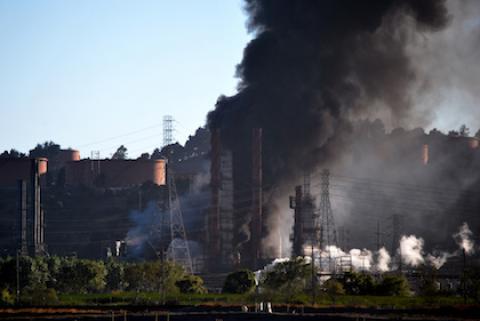If the Supreme Court is right that corporations are people and money is free speech, then Chevron is the biggest loudmouth in Richmond, where I live.
When people think of unlimited campaign spending, they tend to think of national elections, but the most insidious impacts may be taking place at the state and municipal levels. I know Chevron contributes to our local economy because it disbursed more than $2 million in city election campaign money since 2010, or roughly $50 each on me and every other registered voter in our small city of 106,000. The company provides jobs not only at its sprawling Richmond oil refinery but also for public relations, printers and a private detective who was hired a few years ago to smear the mayor.
Chevron wants to get rid of our Green Party mayor and progressive City Council majority because they’ve challenged the company on property taxes and pollution. That’s why in 2012 Chevron spent $422,000 backing a single candidate for one of the seven council seats that pays $16,830 a year. The company wants to return to the days when the council majority was known as the “Chevron 5.”
In August 2012, there was a fire at the refinery. I took pictures of the billowing black column of smoke while 15,000 other people went to local hospitals complaining of burning eyes, nausea and trouble breathing. Cal-OSHA fined the company close to $1 million for safety violations, and it pleaded no contest to a series of misdemeanor criminal charges. That is what corporations now do in lieu of anyone going to jail. I’ll agree with the conservative majority of the U.S. Supreme Court that corporations are people when Texas places one of them on death row.
Now Chevron wants to assure me that things are better, and we should all be “Richmond Proud.” That’s the name it’s given a multimillion-dollar PR campaign of billboards, T-shirts, tote bags, mailers, robo-calls, highly publicized charitable contributions, a local newspaper it created, and TV ads. Phase one of the campaign was all about being proud of our parks and waterfront and youth opportunities, which all expanded under the progressive City Council that Chevron wants to get rid of.
Then I attended a Richmond Planning Commission meeting on the company’s billion-dollar refinery modernization plan, which the City Council could vote on this month. A contingent of folks showed up in blue and white T-shirts reading “A Modernized Refinery. Another Reason to be Richmond Proud.” I couldn’t help noticing that while 80 percent of the folks in the pro-Chevron shirts were white, 69 percent of Richmond’s population is not.
Now in PR phase two, the billboards, TV ads and mailers are telling us how good this plant modernization will be for Richmond. Unfortunately, the $1 billion for the refinery upgrade will not be spent in the part of the facility that caught fire but on a hydrogen plant that will allow the company to burn higher-sulfur-content petroleum from places like Iraq. This could increase air pollutants 24 percent and greenhouse gas emissions 16 percent, by one reading of the company’s environmental impact report.
Chevron, which will probably make barrels of extra money burning this “sour” oil, insists there will be no net increase in pollution, thanks to new and innovative approaches like carbon trading. But even reducing greenhouse gas emissions from an oil refinery is like reducing gun violence at the Colt firearms factory. It misses the point.
Richmond has double the childhood asthma rate of Marin County just across the bay. California is experiencing a historic drought and forest fires linked to climate change brought about by carbon pollution. It’s become a product liability issue. Chevron’s product, used as directed, overheats our planet.
When I asked the company how much it planned to spend in this fall’s city elections (that would include phase three of their media blitz), I was told the company hadn’t decided yet but would support candidates committed to public safety, job creation and other boilerplate.
Richmond Mayor Gayle McLaughlin didn’t mince her words, however. “We get all their pollution not only in the air, but they pollute our elections, too. If they’d reduce their emissions and withdraw from our elections, they’d be respecting our health and democracy.”
Of course, if they’d do that, then I’d be Richmond Proud of them, but I’m not holding my breath, although, living 2 miles from the refinery, I probably should.
[David Helvarg is executive director of Blue Frontier, an ocean conservation and policy group. His latest book is “The Golden Shore — California’s Love Affair with the Sea.”]


Spread the word